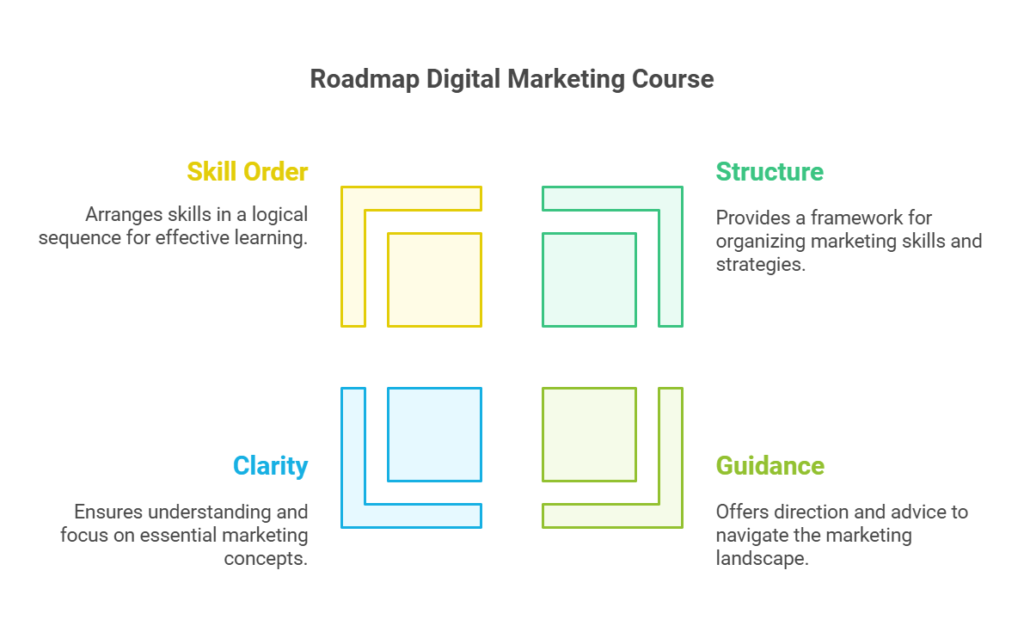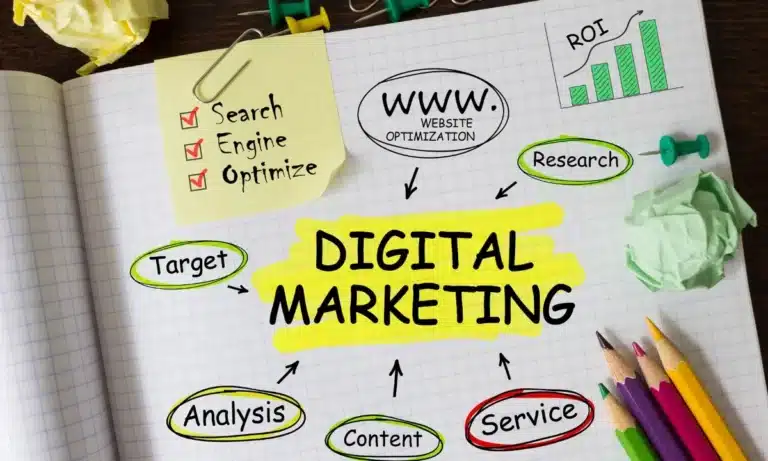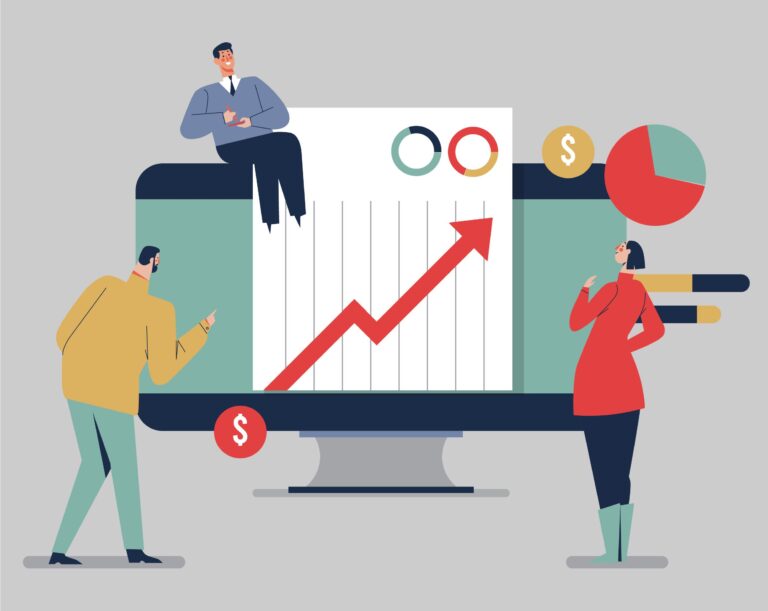Introduction
In today’s fast-paced digital world, businesses of all sizes are turning to online platforms to grow and succeed. Learning digital marketing is essential for anyone aiming to thrive in this competitive landscape. A structured roadmap digital marketing course offers a clear, step-by-step approach, ensuring learners build a solid foundation in core skills. In this guide, we’ll provide a roadmap for building an effective digital marketing skill set, explore key topics covered in a top-quality digital marketing course, and offer practical steps to achieve success.
What to Expect from a Roadmap Digital Marketing Course
A roadmap digital marketing course provides structure, guidance, and clarity on what skills to learn and in what order. This approach is beneficial because it breaks down complex marketing strategies into digestible steps, helping beginners gain confidence and professionals stay updated with the latest trends. Below, we cover the essential elements of a digital marketing course and how they can support your journey to becoming a proficient digital marketer.

1. Understanding the Basics: Digital Marketing Fundamentals
- Why It Matters: Starting with fundamentals ensures that learners have a solid foundation. Topics like SEO, social media, and content marketing basics are core to any roadmap digital marketing course.
- Key Topics:
- Introduction to SEO (Search Engine Optimization)
- Overview of social media platforms for marketing
- Basics of content creation and strategy
- Actionable Steps:
- Familiarize yourself with popular digital marketing terms.
- Research leading marketing channels, such as Google and Facebook.
- Read beginner guides or articles to start with a clear understanding of core concepts.
2. SEO and Content Marketing: The Foundation of Digital Marketing
- Why It Matters: SEO and content marketing drive organic traffic, increasing visibility without heavy ad spending. Courses often dive into keyword research, on-page SEO, and creating engaging content.
- Key Topics:
- Keyword research and analysis techniques
- Content creation and distribution strategies
- SEO for improving search engine rankings
- Actionable Steps:
- Identify tools for keyword research like Google Keyword Planner and Ahrefs.
- Start by creating a blog or content project to practice.
- Follow the top industry blogs for updates in SEO and content trends.
3. Social Media Marketing: Engaging Your Audience
- Why It Matters: Social media is a powerful tool for reaching new audiences and building a loyal following. Learning how to navigate platforms like Facebook, Instagram, and LinkedIn is essential.
- Key Topics:
- Social media advertising basics and audience targeting
- Building a social media content calendar
- Analyzing social media metrics for improvement
- Actionable Steps:
- Set up profiles on major platforms.
- Experiment with posts to learn what engages your audience.
- Track performance metrics, like engagement rate and click-through rate (CTR).
4. Email Marketing and Lead Generation: Building Relationships
- Why It Matters: Email marketing is a cost-effective way to nurture leads and retain customers. It’s often part of a roadmap digital marketing course due to its high return on investment.
- Key Topics:
- Building an email list and segmenting audiences
- Crafting effective email campaigns
- Automation tools for streamlined lead generation
- Actionable Steps:
- Use tools like MailChimp or SendinBlue to handle your campaigns.
- Set up automated welcome and follow-up emails for subscribers.
- Monitor metrics like open rate, CTR, and conversions for ongoing optimization.
5. Data Analytics and Conversion Optimization: Measuring Success
- Why It Matters: Understanding data is crucial for refining your strategies and measuring success. Courses focus on tools like Google Analytics, helping marketers turn data into actionable insights.
- Key Topics:
- Using Google Analytics to track website traffic and understand user behavior.
- Analyzing customer journeys and conversion rates
- A/B testing for improved marketing effectiveness
- Actionable Steps:
- Install Google Analytics and navigate its dashboard.
- Identify key performance indicators (KPIs) for your campaigns.
- Regularly check analytics data to monitor progress and identify trends.
6. Advanced Techniques: Paid Advertising and Retargeting
- Why It Matters: Paid ads help you reach a broader audience quickly. A quality digital marketing course will cover the essentials of running effective ads on Google and social media platforms.
- Key Topics:
- Introduction to Google Ads and pay-per-click (PPC) marketing
- Basics of retargeting and custom audience segmentation
- Budgeting and bidding strategies for cost-effective ads
- Actionable Steps:
- Try creating a small-budget ad campaign on Facebook or Google.
- Test retargeting strategies to engage past visitors.
- Track ROI on each campaign to refine your approach.
Conclusion
Enrolling in a roadmap digital marketing course offers a structured path to mastering essential skills. By following the course steps outlined above, anyone can achieve a high level of proficiency in digital marketing, positioning themselves as a valuable asset in today’s job market.
Main Takeaways:
- Begin with the basics to create a strong foundation.
- Learn SEO and content marketing as a way to attract organic traffic.
- Master social media for audience engagement.
- Leverage email marketing and data analytics to engage and retain leads.
- Explore advanced techniques like paid ads and retargeting for maximum reach.
Frequently Asked Questions (FAQ)
1. What is a roadmap digital marketing course?
- A roadmap digital marketing course provides a step-by-step learning path, focusing on essential skills in a structured format for efficient learning.
2. How much time does it take to complete this course?
- Many courses range from a few weeks to several months, depending on the depth and frequency of study.
3. Are there prerequisites for starting a digital marketing course?
- No formal prerequisites exist; however, familiarity with basic computer skills and internet navigation is helpful.
4. Can I find free resources to supplement a digital marketing course?
- Yes! Many websites, like Google’s Digital Garage and HubSpot, offer free resources.
Incorporate this roadmap digital marketing course outline into your learning journey, and take the first step toward a rewarding career in digital marketing!







